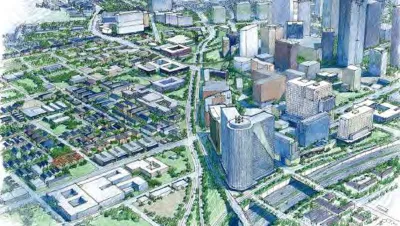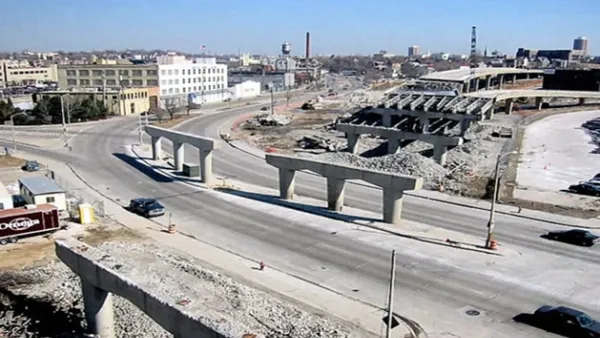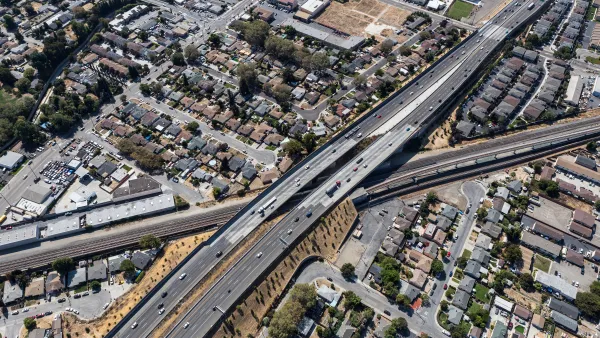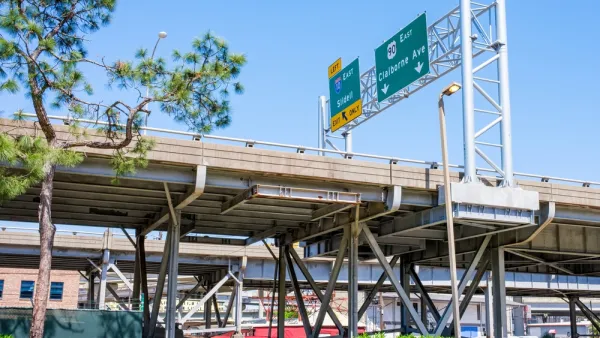The case for freeway in urban areas isn't as unequivocal as it might seem. Plans to undo the damage of the legacies of past freeway planning need to ensure an inclusive future.

An article by Sarah Digiulio, produced by Kaiser Health News and published by the Los Angeles Times, details the ongoing effort by federal lawmakers to provide new funding and programs to rip out some of the urban freeways that bisected and severed neighborhoods during the 20th century (although highway projects with similar consequences are still in planning stages in some parts of the country to the present day).
"Today, as many of these roadways near or pass the end of their intended lifespans, policy makers, social justice advocates and urban planners have called for them to come down," explains Digiulio
However, the article isn't unequivocal about the benefits of removing freeways. The example of the Mandela Parkway—"a four-lane boulevard enhanced by a median with trees and a curving footpath, stretches along a 24-block section of West Oakland"—is cited as evidence of how freeway removal projects (in this case the Cypress Freeway, which collapsed in the Loma Prieta Earthquake of 1989) can improve air quality and offer amenities and other quality of life improvements while also spurring gentrification and displacement.
Jennifer Wolch, a professor of city and regional planning at UC Berkeley is cited in the article describing the ambivalent effects of such projects as "green gentrification."
Her research, focused on the overall public health effects of urban greening, shows that rising housing costs and displacement of longtime residents can also damage their health. Other research has found that residents from marginalized groups reported a lower sense of community after greening transformations.
Despite those cautionary tales, the freeway removal movement seems to be gaining speed has the support of the Biden administration. "[President Biden's] infrastructure plan calls for highway removal to right historical injustices and improve the health of people who live nearby. At least four bills in Congress would fund such efforts, though none is assured passage." Even Texas, where a plan to widen the I-95 in North Houston seems to double down on the freeway planning of the past, has begun a conversation about dismantling existing freeways, rather than building more.
One of the bills currently making its way through Congress, the Reconnecting Communities Act, would spend $3 billion to reconnect communities as a component of the larger, $715 billion INVEST in America Act, which recently cleared the U.S. House of Representatives and headed to the Senate. The Reconnecting Communities Act has already attracted the attention of planners and stakeholders in Baltimore, Philadelphia, and Atlanta.
FULL STORY: Biden has a plan to remove some freeways. Will it make cities more healthy?

Analysis: Cybertruck Fatality Rate Far Exceeds That of Ford Pinto
The Tesla Cybertruck was recalled seven times last year.

National Parks Layoffs Will Cause Communities to Lose Billions
Thousands of essential park workers were laid off this week, just before the busy spring break season.

Retro-silient?: America’s First “Eco-burb,” The Woodlands Turns 50
A master-planned community north of Houston offers lessons on green infrastructure and resilient design, but falls short of its founder’s lofty affordability and walkability goals.

Test News Post 1
This is a summary

Analysis: Cybertruck Fatality Rate Far Exceeds That of Ford Pinto
The Tesla Cybertruck was recalled seven times last year.

Test News Headline 46
Test for the image on the front page.
Urban Design for Planners 1: Software Tools
This six-course series explores essential urban design concepts using open source software and equips planners with the tools they need to participate fully in the urban design process.
Planning for Universal Design
Learn the tools for implementing Universal Design in planning regulations.
EMC Planning Group, Inc.
Planetizen
Planetizen
Mpact (formerly Rail~Volution)
Great Falls Development Authority, Inc.
HUDs Office of Policy Development and Research
NYU Wagner Graduate School of Public Service




























